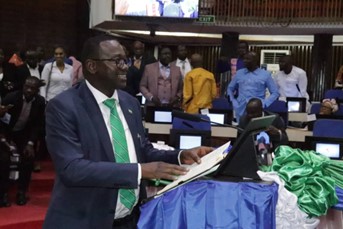The Minister of Finance, Sheku Ahmed Fantamadi Bangura, has defended the restoration of the 5% import duty tax on imported rice, emphasizing its dual role in bolstering Government revenue while fostering and safeguarding local rice production.
In response to queries from Members of Parliament during the discussion on the FY 2024 Finance Act, the Minister underscored that this levy not only contributes to Government income but also buttresses the Feed Salone program by channeling these funds specifically to support rice cultivation.
Highlighting further aspects of the Act, the Minister outlined exemptions on GST for agricultural equipment and machinery imports, alongside efforts to broaden the tax bracket and enhance tax administration efficiency.
The FY 2024 Finance Act encompasses a spectrum of changes, including modifications in excise duties on alcohol and sugary beverages, alterations in taxes concerning cigarettes, cement, and iron rods, as well as a reduction in Minimum Alternate Tax (MAT) for loss-making businesses, and the introduction of excise tax on gambling.
In a Government Press Briefing, Financial Secretary Matthew Dingie clarified that the rice import duty, previously suspended in 2009 due to global circumstances, resulted in an annual loss of approximately 18 million dollars for the Government. He emphasized that this exemption did not significantly affect the cost of a bag of rice.
Dingie referenced various low-income African countries imposing higher import duties on rice to support local farmers, citing examples such as Nigeria (70%), Malawi (35%), Rwanda (35%), and The Gambia (73%). Sierra Leone maintains one of the lowest rates in Sub-Saharan Africa.
He elaborated on the Government’s intention to establish pricing formulas for rice, cement and iron rods, ensuring fair pricing for these vital commodities in the interest of citizens.
Moreover, Dingie announced the Government’s plan to create an Agriculture Fund Account using revenue from the rice tax. This fund aims to bolster the Feed Salone Program, diminish rice imports and amplify local production by empowering local farmers through targeted projects.





I am a regular on line listener of the AYV radio. What I have noticed with talk show programs in Creole/krio, participants and program presenters will sway from speaking in Krio to English most of the time. My opinion is, it is better to stick on one language through out the entire program/show.
Sorry, my above comment was not for your newspaper.